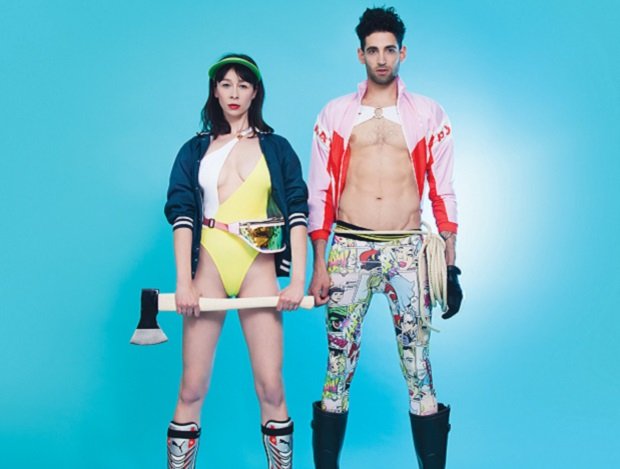Traumboy and Traumgirl have been created in response to one another by Daniel Hellmann and Anne Welenc, and although programmed separately, playing on alternate days in Summerhall’s Old Lab, they are best viewed (and reviewed) with the relationship between them acknowledged.
Both pieces present an open and unashamed view into life as a sex worker in Switzerland. Both are solo shows, with Daniel and Anne talking directly to the audience in TED Talk style; and they move through the same theatrical structures – both pieces open with details of how they discovered sex work, then a detailed story of their first client, then into a piece of choreography in front of a large, white, photography backdrop.
However, there are differences in the content and artistic choices. Daniel chooses to play himself. Anne takes an autofictional approach, presenting herself as an actress called Kim. In the opening for Traumboy, we see Daniel sitting unassumingly in the audience. There’s a standard cold wash of lighting on the stage and the photography backdrop is folded on the floor, yet to be strung up. The following evening, upon entering the same space for Traumgirl, Anne/Kim is lying naked on the floor with her back to the audience. A glittery machine blows bubbles from in between her thighs, ethereal music is playing, the word WORK is projected onto the wall behind her, pink light envelops everything onstage, and the photography backdrop is raised with a live stream of her vagina projected onto it.
Both shows work to alleviate negative expectations of sex work, and both consist of stories with varying degrees of detail from Daniel and Anne’s lives. It seems that the vaguer parts of each story serve as a way of making the audience check in with their expectations. I was left wondering whether Anne is still working in the sex industry as she was never specific about whether she’d left it or not. To me it seemed like she had, but in that moment I wondered whether I had assumed this due to the common perception of brothels as places that nobody would ever want to work in.
One of the main messages that Daniel and Anne present is that their experiences of sex work is not trauma, reiterated many times throughout, explaining that traum is German for dream. The shows’ titles elicit expectations of misery in the performances but both Traumboy and Traumgirl are positive and warm. Also, the way Daniel and Anne engage with the audience is immensely welcoming and caring. At one point, Daniel asks the audience quite personal questions surrounding sex and sex work, but approaches the situation impeccably, taking the time to gauge how comfortable each person is with his enquiries.
Just after the midpoint of each performance, Daniel and Anne explain their processes for interacting with clients: Daniel works independently, finding clients online, and meets them at an agreed location, whereas Anne (or is it Kim?) works in a brothel with other sex workers, a madame and a manager. What is clear from Daniel and Anne is that they both deeply enjoy providing physical intimacy for their clients and see it as an extension of empathy. Once they’ve laid their cards on the table, you can’t help but feel they are both using the same skills of empathy and facilitation on the audience as they would with clients. In doing so, both shows create an environment in which the audience are invited to question their own expectations of sex work, allowing Daniel and Anne to put forward attitudes towards sex and intimacy that are rarely discussed yet arguably much needed in the world.
Traumboy and Traumgirl are presented at Summerhall as part of the Pro Helvetia’s Swiss Selection Edinburgh 2019

